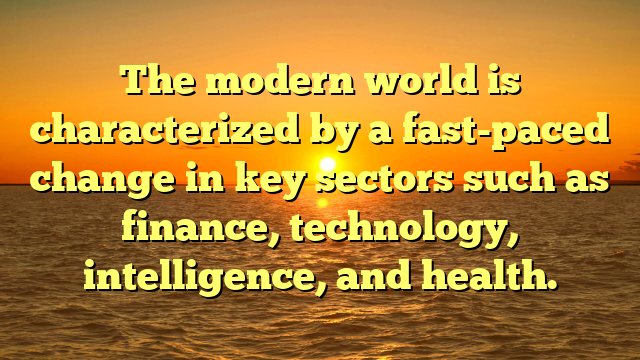These domains have a profound impact on our everyday lives, but they also offer new opportunities for individuals, businesses, and governments to innovate, improve, and thrive. We will dive into how these fields interact, overlap, and affect each other, ultimately contributing to a more efficient, informed, and healthy global landscape.
—
1. Finance: The Backbone of Innovation
In the realm of finance, has undergone a dramatic transformation with the advent of new technologies, artificial intelligence, and digital currencies. The traditional financial systems are facing disruption by innovations like cryptocurrency and blockchain. These innovations are altering the landscape of financial markets, investments, and digital exchanges.
With blockchain, for example, provides a secure and transparent way to record transactions without the need for centralized intermediaries like banks. This reduces transaction times, and boosts transparency. Moreover, cryptocurrencies like Bitcoin and Ethereum provide individuals with potentially lucrative investment options and challenge traditional banking systems.
Another noteworthy trend in finance is the rise of artificial intelligence and machine learning. These technologies enable financial institutions to analyze vast amounts of data, predict market trends, and optimize investment portfolios The role of AI in finance is becoming more pronounced, with programmed systems shaping investment strategies. Financial advisors can now leverage AI tools to offer insights on investment opportunities, forecast market changes, and mitigate financial risks.
—
2. Technology: Shaping the Future
Technology, as a catalyst for progress, is fundamentally reshaping how we connect, work, and innovate. From innovations like AI, smart devices, and quantum technology, technology is reshaping every aspect of our lives.
In the realm of medicine and healthcare, innovations such as telemedicine and wearable health devices allow for real-time health monitoring and diagnosis. These technological advancements give individuals the ability to track their well-being, consult doctors online, and take control of their health.
The integration of AI in technology is also opening doors for new opportunities in automation, problem-solving, and communication. Machine learning algorithms and AI tools are enhancing productivity in diverse sectors, including healthcare, manufacturing, and customer service. For instance, chatbots, AI-driven medical tools, and autonomous machinery are shaping the future that simplify tasks, enhance decision-making, and optimize resources.
—
3. Intelligence: The Human Brain Meets Artificial Systems
The concept of intelligence, whether biological or artificial, plays a critical role in our ability to process information, think critically, and innovate. Human intelligence has been enhanced through advancements in education, technology, and global connectivity. Meanwhile, artificial intelligence (AI) has introduced a fresh perspective to the concept of intelligence.
Artificial intelligence has advanced tremendously, with breakthroughs in areas like deep learning and neural networks. These systems mimic human cognition and allow us to solve complex problems faster. AI is already contributing to transportation, healthcare, and manufacturing, providing solutions that once seemed out of reach.
However, the fusion of natural intelligence and machine learning raises questions about ethics, privacy, and control. It is essential to develop AI in a way that safeguards human interests and rights.
—
4. Health: The Role of Technology and Intelligence in Wellness
Advances in healthcare have become more reliant on cutting-edge technology and intelligent systems. situs bandar bola terpercaya tahun ini 2025 like fitness trackers, smart devices, medical wearables, and digital health platforms are allowing people to track their health, manage conditions, and make better lifestyle choices. AI-powered tools is improving diagnosis, treatment plans, and patient outcomes.
Telemedicine have increased accessibility to healthcare services in rural regions and developing countries. This technology is democratizing healthcare for people who would otherwise have limited access to care. Additionally, advancements in genetic research are allowing for more effective and individualized therapies.
—
Conclusion
To sum up, the fusion of these four transformative fields—finance, technology, intelligence, and health— is creating a world of opportunities As the integration of finance, technology, intelligence, and healthcare will continue to drive progress and innovation. Embracing these advancements will be crucial for individuals, businesses, and governments to stay competitive, relevant, and sustainable in the future.
The modern world is characterized by a fast-paced change in key sectors such as finance, technology, intelligence, and health.
